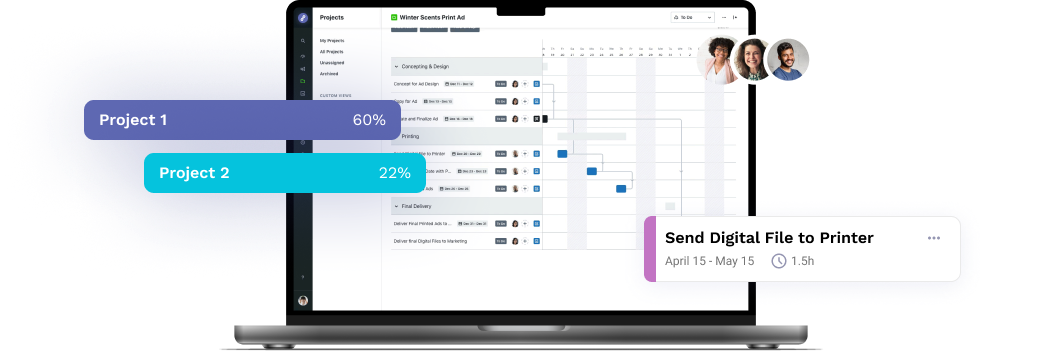
We live in an advanced tech age that has made it very easy for us to create new problems and solutions to those problems by ourselves. We’ve grown accustomed to finding technical solutions to tackle the myriads of technical problems that only our knowledge and expertise can help solve. And yet, more often than not, we completely neglect the challenges faced by the creative masterminds behind it all – ourselves. We think it’s high time we changed that by addressing the challenges faced by creative teams, as well as those running them.
We sat down with Emerce.nl for an insightful interview to shed some light on the matter. The following is the full interview transcript, minimally edited for conciseness – enjoy the read.
Recommended reading: To read this interview in Dutch, click here.
Q: Why Do Marketing Teams Need to Be Creative?
Creativity surfaces in many shapes and forms – one of them being adaptability. Marketing teams need to stay creative so they can keep finding great solutions to big problems as they come. Creativity in marketing has a lot to do with a marketer’s ability to work with what they got and to come up with the most unexpected answer. Marketing is all about innovation, and innovation needs creativity. The moment a marketer stops being creative, they die.
Q: Is Creativity Important in the Corporate Workplace?
Corporations are in dire need of it. That’s because the nature of corporate communications and branding is, in our opinion, very strict, dry, and straightforward. There’s no room for playfulness, nuances, humor, – you name it – in corporate communications. Everything must be done by the book. This makes for effective and efficient communication, quite… ‘boring’.
Bringing creativity into a corporate workplace is the best thing you can do to spice things up and breathe some life, relatability, and humanity in your brand. So, we wouldn’t say creativity is ONLY important… We’d say it’s crucial to a corporation’s survival. Encouraging creativity in a corporate work environment has been shown to increase output and the quality of it. The bigger you let your team think, the greater ideas they will come up with and the happier they will feel.
Q: What Are the Main Obstacles for People in a Professional Environment to Be Creative?
1. Creative differences between creatives themselves, and creatives and the business’s needs – the two rarely, if ever, exist side-by-side, harmoniously. In most cases, concessions must be made from both sides, and the result is often disappointing or less-than-perfect for everyone involved. Creatives feel like their work is altered to the point where it doesn’t feel like theirs anymore, and it only suits business needs.
2. Creative expression – most creatives exchange their ideas and skills for a paycheck, at the cost of their own artistic expression. Many creatives we speak to daily say the work they produce does not feel representative of who they are as individuals and artists. Most feel stuck between a rock and a hard place – selling out to afford life, versus pursuing their own passions and financially suffering for it.
3. A poor understanding of the creative process – projects, even the simplest ones, take significant planning, thought, effort, and time. More often than not, creatives and businesses move at very different paces, and that leads to arguments, frustrations, miscommunication, missed deadlines, poor execution, you name it.
Q: What Is Holding Them Back? And How Can We Remove Those Barriers?
We think every business that wants to unleash the full creative potential of its most creative members should work with the creatives, not against them. We may be biased here, but there’s nothing more stifling to one’s creativity than tight deadlines, KPIs, the need to make everything measurable, and the over-focus on results and nothing more.
Businesses need to realize that not everything can be measured, and that creativity, in all the different forms that is expressed, needs to exist for the sake of existing. Creators create for the sake of creation and self-expression. NOT everything needs to make money. And if you want your creatives to only make things that make money, you’re taking away their self-expression, and you’re bound to lose them.
Q: Do Creatives and Artists Deserve a Different Management Style or Treatment than ‘Regular’ Workers?
We would argue that we all deserve a management style that’s tailored to our role, its responsibilities, industry, and personality. Rather than treating creatives in a special way, we should instead recognize that every profession requires a different management style. With that being said, many creative people feel productive and inspired on different hours and days in the week, so flexibility in hours is crucial.
Q: What Impact Does the Work from Home Revolution Have on the Team’s Creativity?
It’s a double-edged sword, really. We have all the obvious benefits of working from home like flexible hours, no commuting, more time for family, friends, and chores around the house – a very positive move in a future where work exists hand-in-hand with the rest of our life, than opposite it.
Creatives, we’re afraid, have really suffered from this revolution. Don’t get us wrong, we work fully remotely at Lytho, and enjoy the many great benefits that come with it. However, we cannot overlook that since the onset of the pandemic in March 2020, creatives have found themselves doing even MORE work than before, with no breaks or outlets due to the restrictions, and even though things are getting better nowadays, creative burnout is rampant among us.
We think the best way to help your creative team is to literally give them a few weeks off to recharge at this point.
Q: How Important Is Sharing Ideas in a Creative Process?
It’s as important as it is difficult. The more you share, the more different perspectives you hear, and the better informed your result will be. At the same time, the more you share your ideas, the further you subject yourself to potential criticism. So, you need a strong stomach and nerves for that. If you can handle it, then the final product will be so much better. Two minds work better than one, as the saying goes.
Q: How Can We Change the Dynamics of Collaboration?
Traditionally, creatives have been the ones accommodating the needs of businesses. We’re now seeing a shift in our thinking around this. We find truly listening to a creative team’s needs is key. Building trust on both sides will surely come a long way. Businesses need to trust in the creatives and their creative processes, and let them run, instead of trying to control them and their output.
Ask your creative members about their capacity, creative process, most productive hours, and delivery times. Ditch the daily check-ins, forget about the 9-to-5, and let creatives work their creative magic. One thing we do, however, stick with and encourage other business to keep, too, is reasonable and clearly-defined project roadmaps and deadlines. We find creatives perform best when they’re given a reasonable deadline, the permission to ask any and all questions pertaining to the project and allowed to figure out the rest.
Q: What Are the Three Most Important Things that Marketers, Brand Managers and Content Creators Must Do?
1. Invest in the Right Workflow Tools
At Lytho, we’re firm believers in eliminating logistics and boring administrative work from the creative process. It’s the most tedious and arduous tasks that drain us, as well as other creatives, the most. (mymancavestore.com) Investing in the right tools to improve creative workflows and processes can take you and your creative team far. Listen to your team for what works and what doesn’t and take it from there.
2. Look to Unexpected Places for Inspiration
Inspiration strikes when you least expect it, and there’s a reason for that. The life of a creative is one of constant exploration and experimentation. Creatives are like multipliers. If you provide them with a steady flow of stimuli like courses, events, exhibitions, and the flexibility to work during their most productive hours instead of forcing the 9-to-5 on them, the better and novel their ideas and output will be.
3. Mix Things Up
Does a creative in your company want to engage in creative activities during business hours? Good, you should let them do so. A creative person that knows themselves well enough to know when and where to seek inspiration is a blessing. Variety is a key component to creativity. The more of it we, creatives, receive, the greater our results are – we think of more solutions to problems by finding new angles to approach said problems from, and the better our creative batteries remain charged.
Q: What Is the Goal of Changing the Creative Process, the Way We Work Together? What Can We Achieve?
The whole is greater than the sum of its parts. If two heads are better than one, then imagine what ten heads can do! By bringing creative individuals together, we’re able to generate more ideas and delegate work fairly and quickly, which reduces production times and improves the quality of our output.
Q: Addressing the Challenges Faced by Creative Teams: Where (and How) Do We Start?
This is pretty straightforward – by optimizing the creative process with the right creative workflow tools and systems in place, which will allow creative teams to spend more time collaborating and being creative, and less time on meaningless administrative tasks that deduct from the creative process.
Lytho helps you streamline your entire workflow and harmonize all brand collateral under a single, uniform platform. Feel free to reach out to us by scheduling a demo and learning how our creative solutions can boost the effectiveness of your creative projects. We look forward to speaking with you!
Do you want to give yourself and your creative team more room for creative stimulation by automating the boring stuff? Lytho helps you streamline your entire workflow and harmonize all brand collateral under a single, uniform platform. Feel free to reach out to us by scheduling a demo and learning how our creative solutions can boost the effectiveness of your creative projects. We look forward to speaking with you!

Ready to simplify your creative operations and start having a little fun at work again? Schedule time to talk with us.
Let us show you how Lytho’s Creative Operations Platform helps in-house creative and marketing teams do better work, ease the stakeholder experience, and stay on brand.
Schedule a Demo